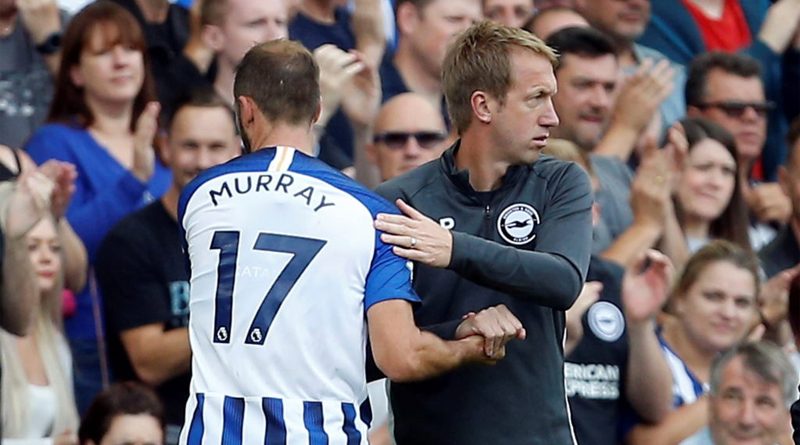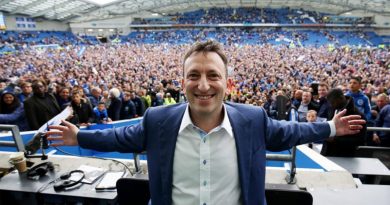Graham Potter and Glenn Murray: The biggest failure of Potterball so far
An hour had been played at the Vitality Stadium and the score was Bournemouth 2-0 Brighton. The Albion were on their way to defeat against a side who had scored only once in the past six games and who had won just four points out of a possible 36. Graham Potter was making a treble substitution and yet still Glenn Murray remained sat on the bench.
You’d have thought that chasing a two goal deficit in a must-win game against a relegation rival might be the time to use Murray. But no. Potter preferred to stick on two wingers in Leandro Trossard and Solly March.
He wanted Brighton to utilise their new-found width by crossing balls into the box for the towering frame of 5’7 Neal Maupay.
Potter would rather play Dale Stephens at right back than use Murray. He prefers 19-year-old Aaron Connolly to lead the line, heaping responsibility on a 19-year-old striker who hasn’t scored since the start of October.
Anyone who’s watched Connolly lately will know he needs a break. He’s clearly feeling the strain, resembling a stroppy teenager as he struts around the pitch moaning and complaining about nothing going his way.
Connolly even had a shit fit and deleted everything on his Instagram profile to do with Brighton recently. And yet he continues to be thrust into the limelight, the pressure of being labelled Brighton’s new wonder kid and Irish football’s saviour after just two goals against a woeful Tottenham Hotspur side weighing heavy on his shoulders. Potter prefers to select him over Murray.
A running theme of Potter’s first six months in the job has been Brighton’s lack of killer instinct. We create plenty of chances – 21 shots in the 3-1 defeat against Bournemouth for example – but we don’t have anyone to put the ball in the back of the net.
Except we do. Graham Potter has sitting in his squad the third most lethal striker in the Premier League last year – Glenn Murray.
Murray converted 25.6% of the shots he took last season. That was a better ratio than Mo Salah, Pierre-Emerick Aubameyang and Sergio Aguero. Only Anthony Martial and Sadio Mane were more clinical than Murray in 2018-19.
Murray was the man who led the delegation of senior players to Chris Hughton prior to the 5-0 defeat at home to Bournemouth last April, asking Chris Hughton to release the handbrake.
Hughton responded by dropping him for that debacle against the Cherries. Privately, Murray had been telling people that he believed with a more attacking approach, he personally could have added at least five more goals to his tally.
In Brighton’s first two season as a Premier League club, Murray notched 36% of our goals. Since Sky Sports invented football in 1992, no other team has been so reliant on one player to score for them.
Murray isn’t the sort of player whose powers begin to wane as he gets older. Even when he first arrived in Sussex as a fresh-faced 24-year-old in 2008, he wasn’t blessed with pace.
If anything, he’s actually been improving the older he gets, drawing on more experience. Murray’s astonishing goal rate is because he knows how to get into goal scoring positions and the exact finish that is needed when he arrives there. You don’t lose that ability as you head towards your 40s.
We saw that in the 1-0 defeat away at Everton. It was a rare occasion when Potter actually gave Murray a decent amount of game time to make an impact.
He responded by having a brilliant header somehow kept out by Jordan Pickford and then seeing a clever dink over the England number one drop agonisingly wide of the post.
In 20 minutes, he did more than any other Brighton player had in front of goal in the previous 70. Enough to earn a start? Most managers would surely consider it, especially if they had such a toothless attack at their disposal, but Potter has instead given Murray just nine minutes out of 180 since. Games in which we’ve picked up just a single point picked up from two of the very few teams below us in the table.
Graham Potter seems to say in the press every week how much he rates Glenn Murray. In fact, he says it a little too much.
You know, the way that you have to stress that you constantly really like Janine from accounts, even if you think she’s a twat. If Potter did rate Murray, then he wouldn’t use him sparingly. The proof of the pudding is in the eating.
Even in December, when Potter consistently rotated his squad to keep his players fresh for six games in four weeks, Murray received just 88 minutes of game time from a possible 540.
The only possible justification for Potter’s reluctance to use a player with 25 Premier League goals to his name over the past two seasons is that he can’t – or more likely – doesn’t want to find a way to fit him into his style of play.
For a highly paid manager who’s just been awarded a new five-and-a-half year contract after winning just four Premier League games in his life, either of those scenarios is troubling.
Let’s say it’s the first and Graham Potter can’t find a way to utilise the talents of the best finisher that the club have on their books. It rather busts the myth of Potter being some innovative, tactical genius if he is unable to devise some simple tactics or a plan for using Murray.
The best managers are those who adapt their principals and methods to the players they have at their disposal. This is especially true when it comes to strikers.
Take Pep Guardiola for example. At Barcelona, he used a little genius like Lionel Messi to win games. At Bayern Munich, he changed his ways to utilise a target man in Robert Lewandowski. At Manchester City, he tweaked his philosophy again to cater for Aguero.
Jurgen Klopp has it done it too. Gegenpress might be the style that you best associate Klopp’s teams with, but at Borussia Dortmund it was a very different type of gegenpress with Lewandowski leading the line compared to Liverpool’s front three of Mo Salah, Roberto Firmino and Mane.
If Potter can’t find a way to get the best out of Murray, then he’s clearly not as talented a manager as we all thought. Especially as it isn’t exactly rocket science how to do so – play traditional wingers and get crosses into the box.
Anthony Knockaert may have departed, but Potter still has the likes of Trossard, March and Alireza Jahanbakhsh who can all cross a ball. Pascal Gross and Aaron Mooy too have shown their abilities to float crosses in when they drift into wide positions.
The more likely reason for Murray’s lack of game time is that Potter doesn’t want to find a way to use him because it would involve going against his principles.
Potter is too wedded to his beliefs of passing and possession-based football to use a traditional English target man, even if it could result in a greater number of chances converted which would lead to more points on the board.
It’s that same stubbornness that means another of the stars of the past two seasons sits alongside Murray on the bench. Shane Duffy isn’t Potter’s cup of tea either because he can’t play a five-yard pass as well as Adam Webster; never mind the fact that Webster gives up at least one good goal scoring opportunity to the opposition per game.
A manager who refuses to budge from their principles despite overwhelming evidence that a change of approach could have a beneficial impact is one who won’t last long at the top level.
It also makes a mockery of those saying we need a new, more mobile version of Murray in this transfer window. What’s the point of spending big money on an identical player to one who hasn’t been used because he doesn’t fit our style of play?
Potter’s continued ignorance of what Murray – and Duffy for that matter – can offer is a real worry; especially as we slip into a relegation battle and all Potter talks about every week is “learning” and “taking the positives” in the aftermath of another predictable game in which we have lots of possession, do nothing with it and then give away cheap goals.
Judging by the prolonged applause Murray gave to the away end at the Vitality Stadium, it looks as though he expects his Brighton career to be at an end. And who can blame him?
At 36, he should be playing regular first team football and as long as he can find a team that will utilise his skill set – as most managers would try and do – then he still has a lot to offer clubs in the bottom half of the Premier League, let alone the Championship.
We’ve been here before of course. A manager with the initials GP not rating Murray and letting him leave – only for us to see him go zooming past us with his new club.
It wouldn’t be a surprise to see Murray move to Nottingham Forest and fire the Tricky Trees to promotion to the Premier League, with them taking Brighton’s place as our lack of clinicalness condemns us to relegation.
Graham Potter not being able or not wanting to find a way to get the best out of Glenn Murray has been the biggest failure of Potterball so far. Let’s hope it isn’t one we end up paying for come May.





This is the Glenn Murray 0 goals from 413 minutes of PL this season and who scored one goal every 320th minute this spring, correct?
Yea I dunno, I think unfortunately the old man’s got… old.
Come on Glenn is too old now the kids are doing okay we nerd an old fashioned centre forward. Benteke, Batshia, Ronaldo that sort of player.